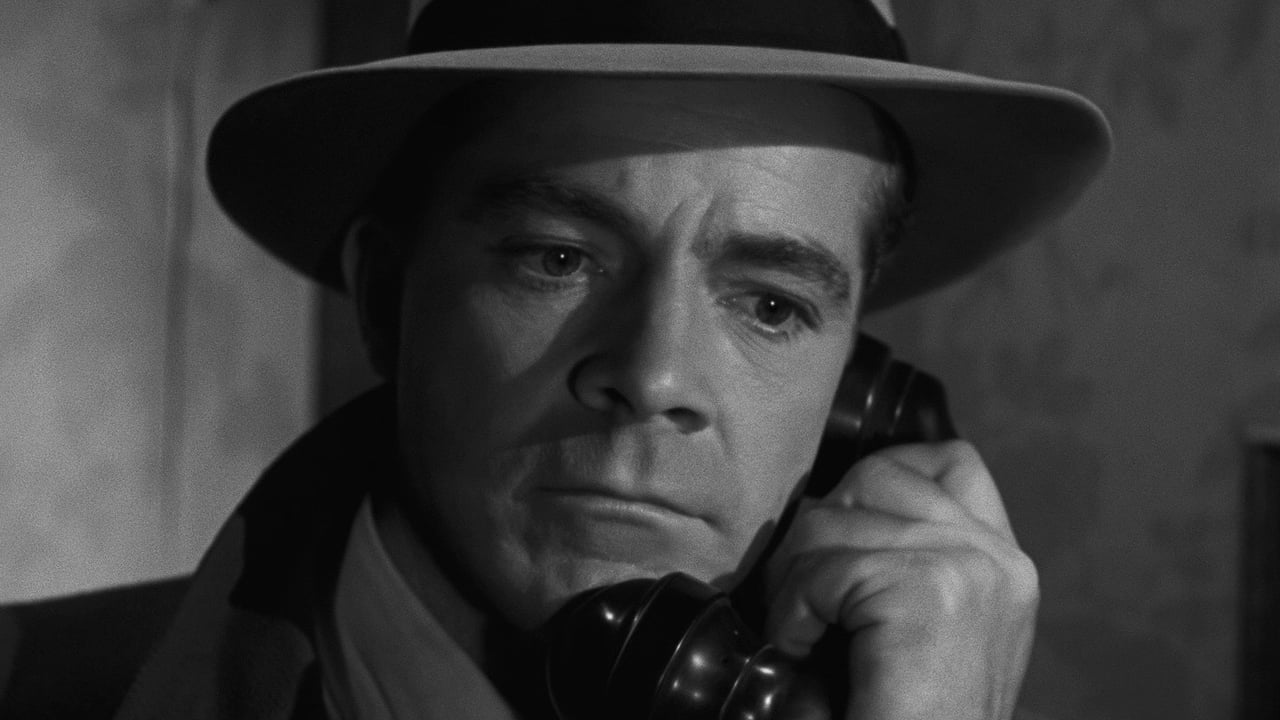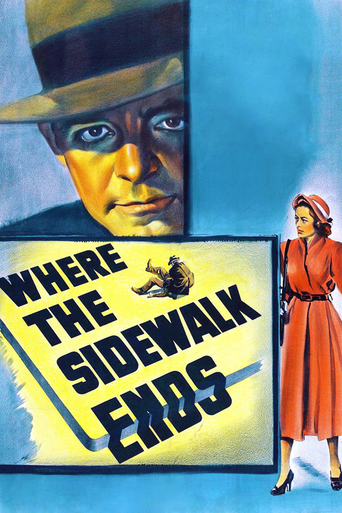



I think this is a new genre that they're all sort of working their way through it and haven't got all the kinks worked out yet but it's a genre that works for me.
View MoreThis Movie Can Only Be Described With One Word.
Better Late Then Never
A Masterpiece!
When gambler Ted Morrison is murdered, Mark Dixon, a New York police detective, goes to interview Ken Paine, a suspect in the killing. Dixon, in fact, knows that Paine is innocent and that the real killer, a gangster named Tommy Scalise, is trying to frame him. (Scalise was trying to avoid paying a gambling debt he owed to Morrison). Dixon tries to explain what he knows, but Paine, a drunkard and gambler, distrusts all cops and attacks him violently. Dixon attempts to defend himself, and in the ensuing scuffle Paine is accidentally killed.A number of films noirs from this period featured tough, uncompromising cops; Jim McLeod, Kirk Douglas's character in "Detective Story" can be seen as a predecessor of Clint Eastwood's "Dirty Harry". When men like McLeod and Glenn Ford's Dave Bannion in "The Big Heat" go outside the law, however, they generally do so in their zeal to put the bad guys behind bars. "Where the Sidewalk Ends", however, goes further than this. It's "hero", if he can be called such, is a cop who commits a crime in furtherance of his own interests. The crime is not the killing of Paine- Dixon never meant to kill him and only struck him in self-defence. The crime is his attempt to interfere with the course of justice by covering up what he has done. Dixon does not tell anyone what has happened but simply dumps Paine's body in the river. The main reason for his actions seems to be that he is already in trouble with his superiors for his heavy-handed treatment of suspects and is afraid to lose his job.A complicating factor is that Dixon meets, and falls in love with, Paine's estranged wife Morgan. Things become even more complicated when Morgan's father Jiggs Taylor becomes the chief suspect in Paine's death. Taylor certainly would have had a motive for such an act because he hated his son-in-law who had often been guilty of domestic violence against Morgan. When Dixon's boss Lieutentant Thomas becomes convinced that Taylor is the killer, Dixon tries to protect the old man, not by confessing to his own involvement but by trying to place the blame on Scalise.(A case of "the framer framed"). The film is sometimes regarded as a "classic of film noir", but it is not really one of my favourites. A degree of moral ambiguity was a common feature of noir, but here we are never sure whether we are supposed to be cheering Dixon on as a fearless crime-fighter or condemning him as a villain who kills a man and then cynically tries to hide the evidence. As a result the film goes well beyond mere ambiguity and ends up in moral confusion. This confusion is not resolved by Dixon's last-minute confession, a confession which seems to have been inspired less by genuine contrition on the part of Dixon (or by a desire to protect Taylor, who has already been cleared of the charges) than by a concern on the part of the film-makers not to breach the Production Code requirement whereby criminals could never be seen to get away unpunished.The screenplay does make some attempt to explain Dixon's behaviour in psychological terms; his hatred of criminals, for example, is said to derive from the fact that his own father was himself a criminal. To make psychoanalysis of this sort work, however, would require a much finer acting performance than we get from Dana Andrews who plays Dixon with stony-faced impassivity throughout. None of the other cast members make much of an impression. The lovely Gene Tierney is wasted as Morgan, a largely passive character who is the object of other characters' emotions but does not do much in her own right.The reason why I have given the film an above-average mark is that Otto Preminger's direction is considerably better than either the script or the acting. The genre was known as "noir" for two reasons, both very evident here. This first is that films noirs were generally shot using by expressionist photography, with strong contrasts of light and dark, and many scenes set at night. ("Where the Sidewalk Ends" probably has more night-time scenes than most noirs). The second is that (in contrast to many Hollywood films of the period) noir was marked by a sense of pessimism and of an ineradicable strain of violence and criminality lurking beneath the outwardly optimistic surface of American society, and this sense is particularly strong here. In common with some other noirs, this is a film we watch as much for its atmosphere as for its story. 6/10
View MoreA poker game gone wrong-An investigation gone haywire, resulting in accidental murder. A cooked cop trying to atone. A model tossed in thanks to her shady estranged husband. Add in the two stars and director of the 1944 masterpiece "Laura" and you have a toxic film noir that doesn't surpass the original, but is great in its own way.If there is a city meant to personify film noir, it is New York. Every single borough with its constantly lighted buildings, twisted streets, rivers, bridges and eternal history of corruption makes the Big Apple the place. Toss in a train crossing the Manhattan Bridge in the middle of the night as a killer tries to get a dead body into his car without being spotted, and you've got the vision of why Film Noir became so special a film genre with so many fans.Dana Andrews and Gene Tierney are reunited and still sparkle in this tight thriller. She's married to a gangster gambler Andrews accidentally killed and she is determined to prove her possessive father, arrested for the murder, innocent of the crime. Gary Merrill plays the gangster, involved in enough crime to get him life, who attempts to blackmail Andrews, demoted for being accused of unnecessary abuse to criminal suspects. That wonderful 1930's character actress Ruth Donnelly has her best later role as a delightfully sarcastic waitress who becomes a cheerleader for Andrews and Tierney to get together, and a young Karl Malden shows great potential as the cop promoted to take Andrews' place.Crisp dialog, tight direction by Otto Preminger, some wonderful visuals of New York at night where an old lady sits up all night near her window simply out of loneliness ever since her husband died. Andrews' cop is not a bad guy; He is simply someone who needs to have his anger toned own. Tierney proves that she is more than just window dressing. Her real-life husband Oleg Cassini has a cameo as himself. As Tierney's father, Tom Tully is powerful, providing both pathos and a bit of comedy.
View MoreThe central character, a troubled cop, is the nucleus of this Film-Noir and as things spiral out of control we are swept into this milieu of maniacs and the machinations of Police procedures. It is compelling cinema and its claustrophobic cage of confinement are ever present.The two stars are here to give us a foundation in an otherwise floundering footing of cement and steel, plaster and glass. They both deliver superb performances and are supported by a strong backdrop of characters and cronies. The cop's alter-ego is a loathsome, effeminate, drug sniffing snob who surrounds himself with beefcake.The Director is not one of the best of Noir's pantheon but manages to deliver a better than average entry despite his penchant for glossy grotesques rather than a down and dirty look. His underbelly always seems to have just a little too much palatability. A look at rather than a look from the gutter. A perspective that ultimately plays better in melodrama than pure Film-Noir.
View MoreThis murder mayhem mystery was pretty intense. The actors performances were pretty awesome, I have to admit. Watching this movie made me want to yell at the screen or hide from it because it was such a suspenseful movie. I really enjoyed it. My grandmother adores this film and she told me that although I do not like movies like this? That she knew I would somehow find a way to enjoy it. Full of interesting camera angles and interesting dialog. I never thought I would like movies like this but my grandmother was right, it captivated me and got me to really enjoy watching. I would recommend this movie completely for anyone who liked murder mayhem movies.
View More